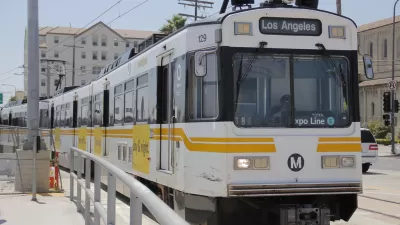UCLA's Paul Habibi believes that L.A.'s lack of affordable workforce housing, the "donut hole" between subsidized housing and high-end housing preferred by developers, is harming the city's competitiveness. In a new report he outlines a solution.
Produced in conjunction with the Los Angelss Business Council, Habibi's report [PDF], titled "Developing Livable Communities: Enhancing Economic Competitiveness in Los Angeles," concludes that the solution to filling the donut hole is to, "[c]reate an incentive to develop housing for this group along transit
corridors, which are currently being expanded in L.A.," writes Matthew DeBord.
"Continued
investment in transit and transit corridors will make LA more
economically competitive," said Habibi, who was the report's lead
author.
"If you think this is about creating more density in infamous L.A.
urban sprawl, you'd be right on track," says DeBord. "'You want to bring the workforce
back toward the employment centers,' Habibi said. 'We need to lower the
economic cost of getting workers from point A to point B.'"
Habibi, who just happens to own over 1,600 apartment units in the Los Angeles area, says that incentives must focus on lowering risks and costs for developers, with easing environmental reviews identified as one potentially effective policy change.
FULL STORY: Workforce housing in LA costs too much. Here's how to fix it

Planetizen Federal Action Tracker
A weekly monitor of how Trump’s orders and actions are impacting planners and planning in America.

Map: Where Senate Republicans Want to Sell Your Public Lands
For public land advocates, the Senate Republicans’ proposal to sell millions of acres of public land in the West is “the biggest fight of their careers.”

Restaurant Patios Were a Pandemic Win — Why Were They so Hard to Keep?
Social distancing requirements and changes in travel patterns prompted cities to pilot new uses for street and sidewalk space. Then it got complicated.

Platform Pilsner: Vancouver Transit Agency Releases... a Beer?
TransLink will receive a portion of every sale of the four-pack.

Toronto Weighs Cheaper Transit, Parking Hikes for Major Events
Special event rates would take effect during large festivals, sports games and concerts to ‘discourage driving, manage congestion and free up space for transit.”

Berlin to Consider Car-Free Zone Larger Than Manhattan
The area bound by the 22-mile Ringbahn would still allow 12 uses of a private automobile per year per person, and several other exemptions.
Urban Design for Planners 1: Software Tools
This six-course series explores essential urban design concepts using open source software and equips planners with the tools they need to participate fully in the urban design process.
Planning for Universal Design
Learn the tools for implementing Universal Design in planning regulations.
Heyer Gruel & Associates PA
JM Goldson LLC
Custer County Colorado
City of Camden Redevelopment Agency
City of Astoria
Transportation Research & Education Center (TREC) at Portland State University
Camden Redevelopment Agency
City of Claremont
Municipality of Princeton (NJ)




























